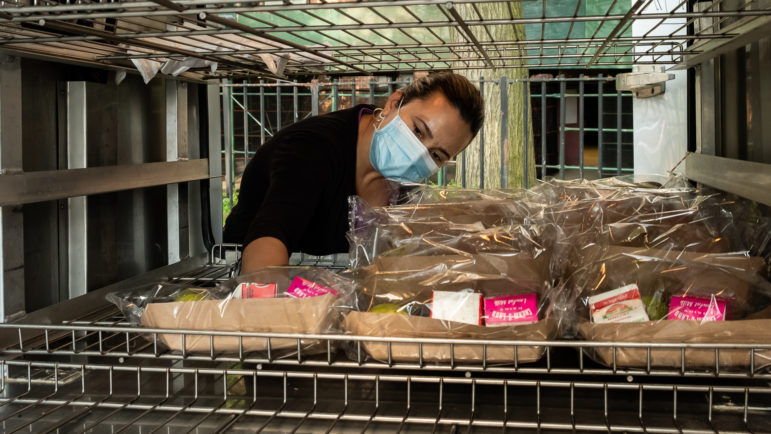
Adi Talwar
On a recent Wednesday morning in the Forest Hills neighborhood of New York City. Queens Community House’s Ms. Ruby Tamayo seen here loading a meal delivery van. Queens Community House delivers meals daily to over 900 clients, five days a week.The city’s 2021 budget for aging services left out $15 million in previously promised money when the City Council passed the $88.2 billion spending plan on June 30, and advocates are just now getting a look at what the reduced funds will mean.
The unallocated money includes $5 million of what is known as “model food budget” funds, which have been deferred until 2022, and another $10 million, also the product of a “model budget” process, for senior centers, that have been eliminated.
Advocates learned the money would not be allocated upon budget adoption on June 30. But over the past week providers have begun receiving word from the city on how those missing allocations will impact individual program budgets, a determination made by the city’s Office of Management and Budget.
In 2018, the administration promised to add $15 million in funds for senior center kitchen staff and meals through a model budget process. In fiscal year 2020, which ended June 30, $10 million of the funds were added. Another $5 million were due in 2021. These funds were in the mayor’s preliminary budget.
And while the mayor’s preliminary budget in February did not include an additional $10 million in model budget funds for non-food funding, the de Blasio administration assured the Department for the Aging (DFTA) that they would appear in the adopted budget, according to March City Council testimony by DFTA Commissioner Lorraine Cortés-Vázquez.
But that was before the coronavirus impact left a gaping hole in the city’s forecasted revenue. Now the city says it will defer that final $5 million increase for food for another year, and eliminate the additional $10 million in other model budget funding increases.
In addition to the model budget funds, another $4 million was cut from the budget in “cost savings”, based on the fact that on-site meals will not be provided at senior centers for the foreseeable future.
And many senior centers are also facing cuts in City Council discretionary funding—grants from individual Council members—since those funds decreased across the board by 17 percent in 2021.
In some cases, the loss of promised food budget increases means that kitchen staff could be laid off and other staff may see pay decreases, advocates for the aging say.
Shyvonne Noboa, division director for senior services at Sunnyside Community Services in Queens, says the organization’s kitchen staff was preparing 350 meals a day for seniors prior to the pandemic. They provided raises to staff based on the expected increase in funding, but she says the organization will now have trouble funding those raises. “They’re woefully underpaid,” Noboa says of kitchen staff.
She says the center had also planned to hire a part-time dishwasher, a much needed addition, but will no longer be able to fill that position.
Scott Short, CEO of RiseBoro Community Partnership, which runs eight senior centers across Brooklyn and prepared 1,000 daily meals prior to the pandemic, said if DFTA does not allow them to use other city funds to offset the unallocated funds, it will force layoffs and a loss of services. While RiseBoro did not hire staff based on the promised $5 million increase, it did allow them to retain some workers.
“Senior budgets already run on extremely thin margins,” Short says. “Even though these are budget add-ons, they allow us to provide the basic level of services that allow us to operate the senior centers.”
‘Get Food’ guts budgets
The city will also cut $4 million to reflect anticipated cost savings for senior centers that are no longer serving meals on-site. Many of those meals are now being provided by the new city-run Get Food NYC program, an emergency program meant to deliver meals to food insecure New Yorkers during the pandemic. But advocates say this cut will affect their existing food budgets. It also raises concern about what some providers believe is the city’s over-reliance on Get Food NYC.
“The city is making a significant commitment to try to figure out how to feed folks through the Get Food program,” says Gregory Morris, Executive Director of the Stanley M. Isaacs Center based in NYCHA’s Isaacs Houses in Yorkville. “It has not made any outreach directly to providers like us reaching who have been doing the work and doing the work well.”
Providers have been concerned that the Get Food NYC program has left them with a smaller role in the city’s senior food system.
The program also had a controversial roll-out, and providers who spoke to City Limits say the program had missed deliveries and sometimes offered less-than-nutritious eats.
As City Limits previously reported, DFTA asked providers who had reached their contracted limit for providing meals to refer new enrollees over to Get Food NYC. But many providers were frustrated that the city had not reached out to them about increasing their capacity.
“Yes, we were at capacity,” says Short of RiseBoro. “But what confuses me about that response is we’re adding capacity to a system to meet an emerging need, so why not add the capacity to the people doing the work?”
Short says that 600 seniors who were served meals by RiseBoro prior to the pandemic were transitioned to Get Food NYC. He estimates that 300 of those seniors chose not to continue enrollment in Get Food.
More than food
Providers are also concerned about their ability to provide non-food services, now that the $10 million planned increase will now go unfilled. At a time when seniors are facing increased isolation at home, many were hoping the additional senior center funds might have allowed an expansion of staffing and virtual services.
And a loss of City Council discretionary funds will heighten the challenges. Sunnyside alone lost $50,000 in discretionary funding from the City Council’s Queens delegation and the Speaker’s office for fiscal year 2021. An additional $26,500 in combined funds from Council members Van Bremer and Dromm, through the Support Our Seniors Initiative, has yet to be allocated, but Zangwill says they remain hopeful it will be added. Zangwill says some of those discretionary funds were to go to case assistance for which there is a dire need, as many seniors are negotiating social services and difficult landlords.
“It’s the worst time to cut services,” says Judy Zangwill of Sunnyside Community Services.
Funding for a geriatric mental health program at Sunnyside, which funds one staffer who has been providing tele-health service to seniors during the pandemic, has received a 15 percent cut through discretionary funds, she says.
A Coronavirus budget
In a statement to City Limits, DFTA said, ”The city is in an unprecedented financial and public health crisis that has impacted all city agencies and their respective budgets. DFTA and its providers will continue to serve older New Yorkers with the same high-quality programs and services, and advocate on their behalf.” The statement acknowledged seniors are disproportionately impacted by COVID-19 and the city hopes the federal government will be able to provide additional support and resources to offset budget cuts.
Providers who spoke to City Limits said they understand the city’s difficult circumstances, but stress that seniors need to be prioritized. Zangwill says that social services are critical to the city’s recovery.
“We’re trying to do everything we can to make sure seniors don’t fall through the cracks,” she says.
“I think we all understand the challenges of the budget environment that we’re in, and we have to remember that the toll of the virus has fallen heaviest on the low income black and brown communities,” says Short. “If we want to avoid the mistakes of the past and have an equitable recovery and protect our city from this kind of disparity, you need to invest in human services.”










3 thoughts on “Senior Services Start to Feel the Pain of City’s Budget Cut”
It’s a quite sad news to be read for me, especially when I’m fond of senior citizens who are in need of the regular services. I’m personally connected to the topic as I work for a housekeeping company as a professional caregiver. The thing is that children and aged people are vulnerable to Covid 19 and now the elder ones are hit by this kind of senior service fund restrictions as well.
Regards,
Maya Isaac
As a former caregiver, I can easily understand how painful it is for seniors during this health crisis situation. However, we can’t underestimate the fact that this pandemic badly wounded the global economy and we are still facing its results so far. But the real question is, how we can prepare ourselves for any global crisis like covid-19 in the future?
Peace,
Rachel Bloom.
https://www.thejacketoutlet.com/
I understand the difficult it is for senior citizens during this health crisis. But, we shouldn’t overlook it that the epidemic has a devastating effect on the global economy and we’re still battling its effects to date.
https://lilpeepmerch.net/product-category/beanie/